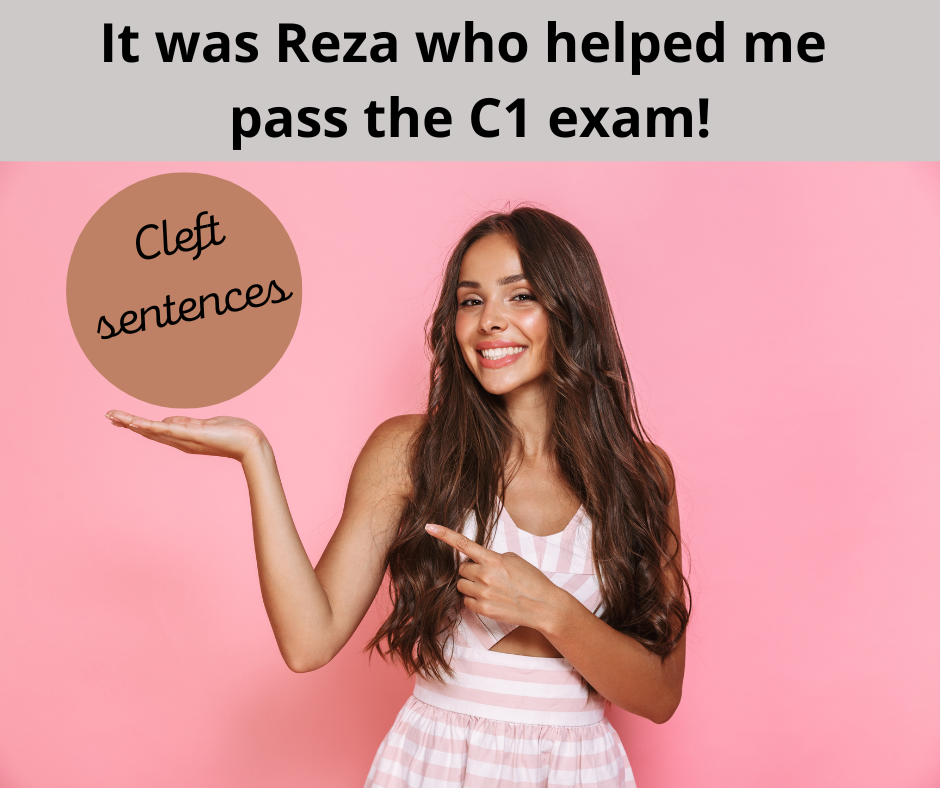
In this podcast, you’ll learn what cleft sentences are and how to use them in English.
Voice message from Victoria from Madrid
Phrasal verbs in songs
“Don’t give up on me baby..” – David Soul
“You’ve gotta shape up….cos I need a man who can keep me satisfied” – Grease
“Rainy days and Mondays” – Carpenters
“I’m all Shook up” Elvis Presley
“I still haven’t found what I’m Looking for..” U2
7 Songs with phrasal verbs: https://theirishenglishteacher.com/learning-english-7-songs-with-phrasal-verbs/

Contact Craig: [email protected]
Cleft Sentences
Cleft means divided or split. It comes from the verb to cleave.
Cleft sentences help to give emphasis in English.
They draw attention to information by placing it at the beginning of a sentence.
Cleft sentences often contain a form of the verb “to be” followed by a noun phrase or pronoun, then the word “that/who/where/when/etc.” and a relative clause.
There are different types of cleft sentences, but one common form is:
It + form of “be” + noun phrase/pronoun + relative pronoun + relative clause
Examples
Harry paid the bill. = It was Harry who/that paid the bill. (Emphasizing “Harry” as the one who paid the bill)
I had my first kiss in a telephone box. = It was in a telephone box where I had my first kiss. (Emphasizing “a telephone box” as the location where he had his first kiss)
She stole my wallet. = It was her (or she – archaic/dramatic) who/that stole my wallet.
We last met in September. = It was September when we last met.
Cleft sentences often start with ‘It’ but can also often start with ‘What’.
Craig ate the chocolate.
It was Craig who/that ate the chocolate.
I want a cup of tea right now.
What I want right now is a cup of tea.
You need a rest to help you feel better.
What you (really) need is a rest to help you feel better.
Cleft sentences are used in spoken and written English, but they are more common in written English. This is partly because we can’t use stress or intonation for emphasis when we write.
It’s quite common to use cleft sentences to correct someone.
Examples:
I think Craig was born in Belfast.
No, it’s Reza who/that was born in Belfast.
The Podcast Show is a conference held in Manchester, isn’t it?
No, it’s London where the Podcast Show is held.
More examples
It was Reza who/that won the singing competition.
This sentence emphasizes Reza as the winner of the singing competition.
What I need is a good night’s sleep.
The focus is on the necessity of a good night’s sleep.
It was Reza who helped me pass the C1 exam.
Reza is highlighted as the person who helped me pass.
BUT, give a different focus and emphasis…
It was the C1 exam that/which Reza helped me pass (not the B2 exam).
The C1 exam is emphasized as the exam, not a different exam.
What we need is a very rich sponsor for our podcast.
The focus is on the requirement for a rich sponsor.
Another common construction is:
Noun phrase + relative pronoun + relative clause + form of “be”…
I’ve asked for this meeting to discuss my salary.
The reason why I’ve asked for this meeting is to discuss my salary.
Your honesty impresses more than anything else.
The thing that impresses me more than anything else is your honesty.
The place where we met is not far from here.
Another good month when you can pick mushrooms here is October.
And another common construction is:
Noun phrase + form of “be” + question word + clause
Chocolate is what gets Craig through the day.
Mining Bitcoin is how Craig might become a millionaire!
San Francisco was where it was all happening in the days of Flower Power.
Discussion
What is it that you like most about your job?
It’s the…
What’s one of your favourite restaurants? What is it that makes this restaurant so popular?
Who’s the person that means most to you?
When is it that you usually feel most productive?

Toffee Nose on Instagram
…and now it’s your turn to practise your English. Why not send us a voice message to practise some cleft sentences, or let us know if you can think of songs with phrasal verbs in them!
Send us a voice message. https://www.speakpipe.com/inglespodcast
Send us an email with a comment or question to [email protected] or [email protected]
This podcast is sponsored, in part, by mansionIngles.com. Visit the online store: https://store.mansioningles.net/
Thank you to all of you who are helping us by supporting this podcast on Patreon. Join our Patreon program for as little as $1.50 per month and you get instant access to recent transcriptions. https://www.patreon.com/inglespodcast
Welcome to our new Patreon supporters who have joined us this month:
Diego Perez
David López
Soledad García Rodríguez
Jon
Valeri Neyeli Villanueva
Manuel Sandoval
Isabel Melián
Alber B
Toni Esteve
Miguel López Costea
In next week’s episode: The most common sound in English
If you enjoyed this podcast, please tell your friends.
The music in this podcast is by Pitx. The track is called ‘See You Later’



